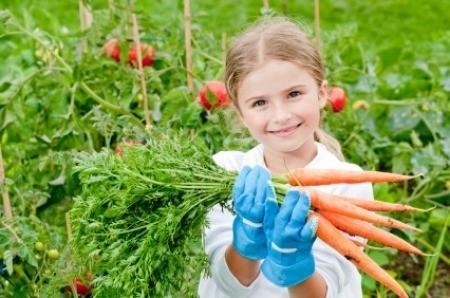Anyone that takes the time and effort to teach a child to garden will reap great rewards for their effort. In fact, we all will. Children who develop an appreciation for nature are more likely to become good stewards of the environment as they grow. Being responsible for tending a garden also fosters a sense of "nurturing" and helps them learn to care for other living things.
Start the planning and design process by determining what the kids want to be doing and learning in the garden. Whether or not they help with the actual construction work (digging or tilling) depends on their age and ability, but even small kids can remove rocks and help with raking and hoeing. Most children find starting seeds exciting, just make sure to start them out with varieties that germinate easily. Using bedding transplants for vegetables or flowers that are difficult to start will provide some instant gratification and help instill confidence. Small children love to water things and dig in the dirt, so provide them with appropriate-sized tools that they can call their own. Keep in mind that your job is to facilitate and show them how, not to do everything for them. Focus on hands-on activities that will give them a sense of pride and encourage them to take ownership of their accomplishments.
When designing a garden for kids, make sure to consider their point-of-view. Depending on their age, that means soliciting their opinions and suggestions for everything from site selection (light, soil, and drainage conditions), to construction and what to plant. Older children are more likely to want their own separate plot, while younger children may be content to have a corner of yours, a small pot, or even a window box. Choose plot dimensions or container sizes reasonable for the number and age of the children involved, as well as your own capacity to see the project through should it fail to hold their attention. The design should focus more on function and less on aesthetics. After all, it is meant to be their space, and what you think looks pretty may not be what they think looks pretty.
Children are much more willing to try fresh fruits and vegetables that they have grown themselves-even things they have never eaten before! Start out with easy, fast sprouting vegetables like radishes, lettuce and baby carrots, and then build up to a teepee for scarlet runner beans or a small pumpkin patch.
Don't forget to plant some flowers. The younger kids are, the more they like to pick them. Children are attracted to flowers' bright colors, and enjoy the opportunity to pick bouquets for family and friends. Some of the easiest and most pleasurable-to-grow flowers include marigolds and zinnias. Look for cutting flower varieties with seeds large enough for small hands to handle and plant easily.
Kids are washable. Let them, in fact expect them, to get dirty. Providing them with kid-sized hats, gloves, and boots will make gardening fun while protecting them from the elements.
Stay safe & chemical-free. Foregoing the use of chemicals when gardening with children doesn't need any further explanation. However, in urban areas it's a good idea to have the site's soil tested for lead and other contaminants to make sure it is safe for children. Contact your state's or county's extension agency for further information.
Be nice to bugs. Children don't become afraid of worms, caterpillars, and other insects in the garden until we pass on our prejudices. Try to teach children to see bugs and other garden animals as integral parts of the ecosystem that are simply going about their own business of gardening. Encourage them to grow up curious and amazed by the natural world, not afraid.
Keep it fun. Have enough size appropriate equipment on hand to allow kids to work on tasks. It's a good idea to have a loose plan for how kids' time in the garden will be organized so they don't get bored, yet remain flexible and open to any "teachable moments" that happen to come along. When garden time is over, get everyone to help with clean-up.
Be generous with compliments. As children get older, they often hear less positive feedback from adults. Empower your kids by telling them often that they have done a good job.

About The Author: Ellen Brown is an environmental writer and photographer and the owner of Sustainable Media, an environmental media company that specializes in helping businesses and organizations promote eco-friendly products and services.
Add your voice! Click below to comment. ThriftyFun is powered by your wisdom!
Add your voice! Click below to comment. ThriftyFun is powered by your wisdom!